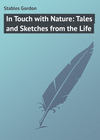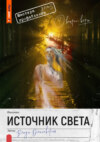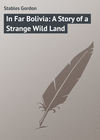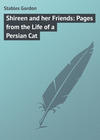Kitobni o'qish: «In Touch with Nature: Tales and Sketches from the Life»
Chapter One.
Rowan-Tree Cottage
“The merry homes of England!
Around their hearths by night,
What gladsome looks of household love
Meet in the ruddy light!
There, woman’s voice flows forth in song
Or childhood’s tale is told,
Or lips move tunefully along
Some glorious page of old.”
Mrs Hemans.
“You’re my Maggie May, aren’t you?”
There was a murmured “Yes,” and a tired and weary wee head was laid to rest on my shoulder.
We were all sitting round the log fire that burned on our low hearth, one wild night in winter. Outside such a storm was raging as seldom visits the southern part of these islands. It had been hard frost for days before, with a bright and cloudless sky; but on the morning of this particular day the blue had given place to a uniform leaden grey. The cloud canopy lowered, the horizon neared, then little pellets of snow began to fall no larger than millet-seeds, till they covered all the hard ground, and powdered the lawn, and lay on the laurel-leaves, and on the ivy that the sparrows so love. Gradually these pellets gave place to broad dry flakes of snow.
“How beautiful it was, falling so silently all day long,
All night long, on the mountains, on the meadows,
On the roofs of the living, on the graves of the dead.”
Yes, silently it had come down, and by sunset it was some inches deep on every tree; and very lovely were the Austrian pines and spruce-firs on the lawn, with their branches bending earthwards under their burdens of snow.
But later in the evening a change had come over the spirit of the scene, and a wild wind had begun to blow from the east. It blew first with a moaning, mournful sound, that saddened one’s heart to listen to; but soon it gathered force, and shrieked around the cottage, and tore through the leafless branches of the tall lime-trees with a noise that made both Frank and me think of gales and storms in the wide Atlantic.
Little Ida, our youngest tottie, was sitting on the hearth painting impossible birds of impossible colours, and using Sir John the Grahame’s back as an easel. She shook her paint-brush at me as she remarked seriously, “She is my Maggie May, and ma’s Maggie May, and Uncle Flank’s Maggie May, and Sil John the Glahame’s Maggie May.” My wife looked up smiling from her sewing.
“Quite right, child,” she said, “she is all our Maggie Mays.”
“O! ma,” remonstrated Ida, “that’s not dood glammer. There touldn’t be two Maggie Mays, tould there, pa?”
“Quite impossible,” I replied; “but how would you say it?”
“I would say – ‘She is all of us’s Maggie May.’”
Having put our grammar to rights, Ida went quietly on painting.
Maggie May, it will be gathered from the above, was a pet in the family circle: she certainly was at present, though not the baby either.
The facts of the case are as follows: Maggie May was an invalid. Not very long before this she had been lying on a bed of pain and illness, from which none of us had expected to see her rise. She was but a fragile flower at the best, but as her recent indisposition had been partly attributable to me, I had tenfold interest in getting her well and strong again.
It happened thus: our bonnie black mare Jeannie has been allowed to have a deal of her own way, and never starts anywhere till she has had a couple of lunch biscuits and a caress. After this she will do anything. I had driven the two girls over to a farm about eight miles from our cottage, and on the way back had occasion to call on a friend. “Stand quiet,” I said; “Jeannie, I won’t be long, and I’ll bring you a biscuit.” Jeannie tossed her tail and moved her ears knowingly as much as to say, “All right, master. Don’t forget. A bargain is a bargain.”
But woe is me! I did forget, completely; and when I jumped into the phaeton Jeannie refused to budge.
Well, I suppose I lost my temper. I flicked her with the whip. Then the mare lost hers. She screamed with rage, and next moment she was tearing along the road with the bit in her teeth at a fearful speed. All my efforts to control the speed of the runaway were in vain. Little Ida clung in terror to me; Maggie May sat firm, but pale.
On we rushed, luckily meeting nothing on the road. A whole mile was speedily pat behind us. But half a mile further on was the dismal dell called Millers’ Dene, with the descent to it dangerous even at a walking pace. To attempt to take it, at the rate we were now moving, would be certain destruction. Could I check the mare before we reached the brow of the hill? I tried my utmost, but utterly failed.
Then my mind was made up. There were broad hedges at each side of the road, and no ditch between.
Summoning all my calmness and strength then, for a supreme effort, and just as we had reached the end of the level road, and the dreadful dene (a glen or ravine) lay deep down before us, with a sudden wrench I swerved the mare off the road and put her at the hedge.
It was a desperate remedy, but so far successful, and the only one really hurt was poor Maggie May.
It was one of those adventures one never forgets.
The child had received a terrible shock, and for weeks hovered ’twixt death and life. No wonder then that we made much of her, now we had her back amongst us once again; and that each of us did our best to nurse back the life and joy she had been almost bereft of for ever.
This needed all the more care, in that the shock had been purely nervous, and her mind, always sensitive, sympathised with her body.
Very pleasant, quiet, and delightful were the evenings we now spent at Rowan-Tree Cottage. We cared very little to-night, for instance, for the wild wind that was raging without, albeit we sometimes thought – not without a kind of shudder – of sailors far at sea, or of travellers belated in crossing the moors.
Uncle Frank – as we all called him – and I had constituted ourselves the story-tellers at these little fireside reunions. A right jolly, jovial sailor was Frank, with a big rough beard, tinged with grey, a weather-beaten face as brown as the back of a fiddle, and blue eyes that swam in fun and genuine good nature.
Frank had been everywhere by sea and land, and I myself have seen a bit of the world. It would have been strange indeed, then, if we could not have told stories and described scenes and events, from our experience, that were bound to interest all who listened.
Sometimes these experiences would be related in the form of conversations; at other times, either Frank or I had written our stories, and read them to our little audience.
Stories were interspersed with songs and the music of the fiddle. Frank was our sweet singer for the most part; he was also our musician. Flaying, however, on his part was never what you might call premeditated; something in the air, you might say, or in the state of our feelings, rendered music at times a necessity; then Frank would take up his instrument as quietly and mechanically as if it had been that meerschaum of his which, being a sailor, he was allowed to smoke.
Now, in the evenings, with his fiddle in his hand, Uncle Frank was simply complete. “An accomplished player?” did you ask. Perhaps not; certainly not what is called a trick-player. But the fiddle – O! call it not a violin – the fiddle when in Frank’s hand spoke and sang. They say that a good rider ought to appear part and parcel of the horse he bestrides. Frank seemed part and parcel of the instrument in his grasp. Bending lovingly over it, his brown beard floatingly on its breast, while he played, the fiddle verily seemed inspired with Frank’s own feelings and genius. And while you listened to the melting notes of some old Irish melody, the green hills of Erin would rise up before your mind’s eye, and the fiddle sang to you of the sorrows of that unhappy isle. Or the strains carried you away back through the half-forgotten past, to the days of chivalry and romance, when —
“The harp that once through Tara’s halls
The soul of music shed.”
But in a moment the scene was changed, and Frank was playing a wild Irish jig which at once transported you to Donnybrook Fair. Paddy in all his glory is there; you think you can see him dancing on the village green, as he twirls his shilelagh or smokes his dudheen.
But anon Frank’s fiddle, like the wand of a fairy, wafts us away to Scotland, and the tears come to our eyes as we listen to some plaintive wail of the days of auld lang syne, some sweet sad “lilt o’ dool and sorrow.”
Or we are transported to the times of the Jacobite rebellions, and as that spirited march or that wild thrilling pibroch falls on our ears we cannot help thinking that, had we lived in those old days, and heard such music then, we too might have fought for “Bonnie Prince Charlie.”
It would be difficult to give the reader any very definite idea of the appearance of our cottage outside or inside. Though not very far from the village, it was so buried in trees of every sort – elms, oaks, lindens, chestnuts, pines, and poplars – that no photographer, or artist either, could ever sketch it. Much less can I. But just imagine to yourself all kinds of pretty shrubberies, and half-wild lawns, and rustic rose-clad arches, and quaint old gables, and verandahs over which the sweet-scented mauve wistaria fell in clusters in spring, when the yellow laburnum and the lilacs were in bloom. Let flowers peep out from every corner and nook – the snowdrop, the crocus, daffodil and primrose in April, with wild flowers on the lawns in summer, and syringas and roses even in the hedges; and people the whole place with birds of every size, from the modest wee wren or little tit to the speckled mavis and orange-billed blackbird, that sang every morning to welcome the sunrise; let wild pigeons croodle among the ivy that creeps around the poplar-trees, and nightingales make spring nights melodious; and imagine also all kind of coaxing walks, that seemed to lead everywhere, but never land one anywhere in particular; and you will have some faint notion what Rowan-Tree Cottage was like.
To be sure our place was most lovely in spring and summer, but it had a beauty of its own even in winter, when the snow lay thick on the lawns and terraces, and seemed to turn the trees into coral. We had pets out of doors as well as pets inside – wild pets as well as tame ones.
The former were chiefly the birds, but there were splendid great brown squirrels also, that used to run about the lawn with their immensities of tails trailing over the daisies, and that, if they heard a footstep, simply got up on one end the better to see who was coming: if it was any of us, they were in no hurry to disappear; but if a stranger hove in sight, then they fled up a neighbouring elm-tree with a celerity that was surprising.
There were tame dormice too, that peeped out from among the withered leaves or climbed about on the may-trees close beside our garden hammocks. They easily knew the shape of a stranger, or the voice of one either, and used to slide slily away if any person unfamiliar to them appeared on the scene.
“Listen to the wind,” said mamma; “why it seems to shake the very house!”
“It sounds like wild wolves howling round the door,” said Frank.
“But see how brightly the fire is glowing,” I remarked, in order to give a less dismal tinge to the situation.
Frank got up and went to the door to look out, but speedily returned. “Why,” he said, “it is almost impossible to breathe outside. It puts me in mind of some nights I spent during the winter of 187-, in the Polar Regions.”
“Tell us all about it, Frank; but first and foremost just put a few more logs on the fire.”
Frank quietly did as he was told, and presently such a glorious gleam was shed abroad as banished every feeling of gloom from our hearts.
Sir John the Grahame, our great wolfhound, who had been dreaming on the hearth and doing duty as Ida’s easel, begged leave to withdraw, and Ida herself drew her footstool back.
Frank took his fiddle and sat for some time gazing thoughtfully at the fire, with a smile on his face, playing meanwhile a low dreamy melody that we could have listened to long enough.
The air he was playing we had never heard before, but it seemed to refresh his memory and bring back the half-forgotten scenes of long ago. “If,” he began at last, still looking at the fire as if talking to that, “if you will take a map of the world – ”
But stay. Frank’s story deserves a chapter all to itself, and it shall have it too.
Chapter Two.
A Christmas in the Arctic Ocean
“Here Winter holds his unrejoicing Court,
Here arms his winds with all-subduing frost,
Moulds his fierce hail, and treasures up his snows,
Throned in his palace of cerulean ice.”
Thomson.
“If you will take a map of the world,” began Frank, “and with a pin or a needle to direct you, follow one of the lines of longitude running south and north through England, up towards the mysterious regions round the Pole, you will find that this line will run right away through Scotland, through the distant Orkney and Shetland, past the lonely Faroe Isles till, with Iceland far on the left, you cross the Arctic Circle. Go north still, and still go north, and presently you will find yourself near to a little island called Jan Mayen, that stands all by itself – oh! so desolate-looking – right in the centre of the Polar ocean. In that lonely isle of the sea I spent my Christmas many years ago.
“What took me there, you ask me, Ida? I will tell you. I was one of the officers of a strongly built but beautiful steam yacht, and we had spent nearly all the summer cruising in the Arctic seas. For about three weeks we sojourned near an island on the very confines of the No-Man’s land around the Pole, and nearly as far to the nor’ard as any soul has ever yet reached.
“We named this island the Skua, after our good yacht – a wild mountainous island it was, with never a trace of living vegetable life on it, but, marvellous to relate, the fossil remains of sub-tropical trees.
“I say we sojourned there, but this need not give you the idea that we stopped there of our own free will, for the truth is we were caught in a trap – a large one sure enough, but still a trap. We found ourselves one morning in the midst of an ocean lake, or piece of open water in the ice-field, as nearly circular as anything, and about four miles in width. We wanted to get out, but everywhere around us was a barrier of mountainous icebergs. So, baffled and disappointed, we took up a position in the centre of the lake, blew off steam, banked our fires, and waited patiently for a turn in events.
“In three weeks’ time a dark bank of mist came rolling down upon us, and so completely enveloped our vessel that a man could not see his comrade from mast to mast.
“That same night a swell rose up in the lake, and the yacht rocked from side to side as if she had been becalmed in the rolling seas of the tropics, while the roar of the icebergs dashing their sides together, fell upon our ears like the sound of a battle fought with heavy artillery.
“But next day the swell went down, the motion had ceased, and we found to our joy that the great bergs had separated sufficiently to allow us to force a passage southwards through the midst of them. A very precarious kind of a passage it was, however, with those terrible ice-blocks, broader than the pyramids, taller than churches, at every side of us.
“South and south we now steamed, and the bergs got smaller and smaller, and beautifully less, till we came into the open sea, and so headed away more to the west.
“‘Boys,’ said our good captain one day, ‘this is a splendid breakfast.’ And a splendid breakfast it was. We had all sorts of nice things, beefsteaks and game pasties, fresh fish, and sea-birds’ eggs – the latter so beautiful in shape and colour that you hesitated a moment before you broke the shell, to say nothing of fragrant tea and coffee, and guava jam and marmalade to finish up with.
“‘Boys,’ said the captain again, as he helped himself to an immense piece of loon pie, ‘it is far too soon to go back to England yet, isn’t it?’
“‘Yes, much too soon.’
“‘Well, I’ve got an idea. Let us bear still more to the westward, and have a look at the island of Jan Mayen. We’ll get some fun there, I’ll be bound; it used to be quite uninhabited, you know, but I was told before leaving our own country that the Yankees – enterprising fellows – had resolved to build a walrus station there for summer months. Now, wherever you find Yanks in these seas, you find Yacks (a tribe of Innuits, of somewhat migratory tendencies). And between the two of them we ought to enjoy ourselves. Shall we go?’
“‘By all means,’ cried everybody.
“Well, we made the island easily enough, in about ten days’ time, and after sailing about halfway round it without seeing anything at all except immense cliffs of snow-capped rocks, against which the waves were beating with a noise like distant thunder, we found a kind of bay, with a beach on which boats could land. Into this we steamed boldly enough, and presently the noise of the anchor cable rattling over the bows seemed suddenly to awaken – it was early morning – the inhabitants of a curious little village that stood near the head of the bay. There was only one long low wooden hut, all the rest of the buildings being primitive in the extreme; indeed, they looked far more like gigantic mole-heaps than the residences of human beings.
“But forth the inhabitants all swarmed; at all events, to the number, I should think, of ’twixt thirty and forty, and a stranger-looking group of individuals it has never been my lot to witness.
“I guessed then, and I found afterwards I was right, that they consisted of men, women, and children; but the fun of the thing was that they were all dressed perfectly alike and looked alike, differing only in size. The dress of the men was composed of skins entirely; they were about five feet high, and broad in proportion. The dress of the women was identical; they were six inches shorter: and the children were all dressed just like their papas and mammas, so they looked like tiny old men and women. And when we landed and stood on the beach among these strange but harmless creatures we found them funnier-looking still; for they all had round, brown faces, all flat noses, and all little beads of eyes that seemed to twinkle with merriment, although nearly hidden by brown cheeks that seemed to shake every time they spoke.
“Amongst these strange people there was one tall figure who stood aside, all by himself, and didn’t laugh in the least. A Yankee he was, six feet four in his boots, if an inch. He was dressed from top to toe in the skin of a polar bear.
“‘Gentlemen,’ he said, presently, ‘if you’re quite done guffawing, perhaps you’ll permit me to welcome you to the island of Jan Mayen.’
“We were serious in a moment, took off our caps and apologised, and ten minutes afterwards we were rowing the Yankee off to breakfast.
“He told us, in the course of conversation, that he was head of the walrus station; that during his stay in the island they had got no end of ivory and blubber; that there was capital sport; and ended by saying:
“‘And now that ye’re come, gentlemen, I hope ye’ll stop and spend next Christmas with me.’
“We laughed at the very idea of spending Christmas in such a place; but little we knew.
“The Yankee was right, the sport was glorious; all sorts of Arctic birds and beasts fell to our guns, and weeks went by, and still we postponed our departure; but at last, one day, we determined to start.
“When we awoke, however, on the following morning, it was to find that during the night an immense shoal of heavy icebergs had floated in from the sea and entirely hemmed us in. The same day the frost set in.
“The captain first pulled a long face, then he laughed.
“‘Boys,’ he said, ‘we must make the best of a bad job. We are bound to stop here till spring.’
“October flew past, November died away, and before we knew where we were Christmas week came round. You see the time had gone quickly because we really had been enjoying ourselves.
“Yet I, for one, could not help contrasting my present position with what it would have been at home in old England. How different it was here! yet the very difference made it quite charming. Suppose that you had stood on the deck of our brave yacht and looked around; you would have seen that the whole bay was frozen over with thick black ice. No need for boats now, we could skate to the shore. Behind us, seaward, across the month of the bay, stretched a rugged wall of serrated icebergs; on each side of the bay were the ice-clad rocks; shoreward, as you turned your eye, there was first the Innuit village, then the land rose gradually upwards, a snow-clad valley rock-bound, till, in the far distance, behold a vast, towering mountain of ice.
“Now remember that we never saw the sun at this time; we had no day at all, nor had had for a whole month. But who can picture the glory of that Arctic night? My pen seems to quiver in my hand when I attempt to describe it to you. During this Christmas week we had no moon. We did not miss the moon any more than we missed the sun. But we had the stars; and somehow, away up in these regions of the Pole, we seemed nearer to the heavens; anyhow, those stars appeared as large as saucers and as bright as suns, and the sky’s blue between them was blue.
“We had the stars, then, but we had something else; we had the Aurora Borealis, in all its splendour of colour and shape. At home we see the Aurora on clear frosty nights only, as a bow of white scintillating lights above the northern horizon. Here we were dwelling in the very home of the Aurora; it stretched from east to west above us, a broad belt of radiant coloured lights. It was a gorgeous scene.
“I have said that the bay in which our yacht lay was all frozen over; but this is not strictly true, because there was one portion of it, about half an acre in extent, and lying close under the barrier of icebergs, which was always kept open. This piece of open water was not only our fishing-ground, but it was a breathing-spot for many sea-mammals.
“During this happy but strange Christmas week we had all sorts of fun on board, and all kinds of games on the ice. Skating under the Aurora! why, you should have seen us; a merrier party you never looked upon.
“‘Boys,’ said the captain one morning, ‘I’m going to give those Innuits a Christmas dinner.’
“‘Hurrah!’ we all cried. ‘What fun it will be!’
“Christmas came at last, and preparations had been made to spend it cheerfully for more than a week beforehand.
“After service – and how impressive the service was, held on the deck of that Aurora-lighted ship, I shall never forget – after service, we all rushed down to dinner. We were to have ours early, because the Yacks’ entertainment was to be the great event of the twenty-four hours.
“After our dinner we had songs and pleasant talk – the pleasantest of talk; for we chatted of the dear ones at home, who probably at that very moment were fondly thinking of us. The men forward enjoyed themselves in like manner. Then the cry was ‘Hurrah! for the shore.’
“A large marquee, which we had on board, had been erected, and in this tent we found all the male and female Yacks assembled. Expectant Captain Bob, who commanded the Innuits, and was the merriest of them all, sat at the head of the great deal table, and on one side of him was his wife, Oily, on the other his pet sister, Shiny. Both Shiny and Oily were all on the titter with joy.
“When the great pudding was carried in on a hand-barrow and placed in front of Captain Bob, the astonishment on the faces of these funny little folk was extreme; but when the brandy was ignited on the top of the pudding, then up started Captain Bob and every Yack in the room, and a wild rush was made for the door. But peace was soon restored, and this king of puddings served. It was well it was a large one; it was well there were two more of the same size to follow, and I do believe if there had been half a dozen they would have found room for them. No wonder that when they had eaten and drunk until more than satisfied they rose up to dance. As they danced, too, they chanted a wild, unearthly kind of a song, each verse ending in ‘Ee-ay-ee,’ from the women, and ‘Oh! ah! oh!’ from the men.
“At last there was a dead silence, and all the Yacks flocked together, and presently out from their midst came Captain Bob – not willingly, for Oily and Shiny were shoving him along, yard by yard, with many a slap on his sheepish shoulders.
“‘Go ’long wid you,’ they were saying; ‘de capitan man not eat ye. Plenty quick go.’
“‘What is it, Bob?’ said the captain.
“‘They want more pudding,’ said shy Bob.
“‘Ah!’ cried Captain Browning, laughing; ‘I thought that would be the cry. Steward, bring up the last two puddings, positively the last.’
“The puddings were cold – they were frozen; and this is how they were served: they were simply rolled like bowling balls into the midst of them.
“And here I drop the curtain. We went away and left them scrambling over their frozen fare.
“When spring returned, with many a blessing following us, we steamed away south, and in due time reached dear old England once again; but no one who was on board the saucy Skua is likely to forget that Christmas we spent in the Arctic Sea.”
“So now good-night, Maggie May, and good-night all,” said Uncle Frank, getting up and laying his fiddle as carefully aside as if it had been a living, breathing thing.
“I’ll sleep soundly to-night,” he added.
“The wind in the trees won’t keep you awake,” I said, laughing.
“Quite the reverse, lad,” replied Frank; “I shall take it for the sound of the waves, and dream I am far away at sea.”
And after he had gone aloft, as he called it, we could hear that deep manly voice of his, trolling forth a verse of that grand old hymn:
“Rocked in the cradle of the deep,
I lay me down in peace to sleep;
Secure I rest upon the wave,
For Thou, O Lord! hast power to save.”



















